https://philaholisticclinic.com/treatment-for-panic-attacks/
Treatment for panic attacks
Treatment for panic attacks can help you lessen the severity and frequency of your panic episodes while also improving your everyday function. Psychotherapy and medicine are the two primary therapeutic methods depending on your preferences, history, and severity of your panic disorder. If you have access to therapists who specialize in treating panic disorders, one or both forms of these therapies may be suggested.
If you regularly suffer from panic attacks or if your anxiety affects your daily life and general well-being, consider talking to your doctor. With mental health, it’s important to seek help as early as possible. It can be very isolating when you feel like no one else understands how you are feeling, but you are not alone.
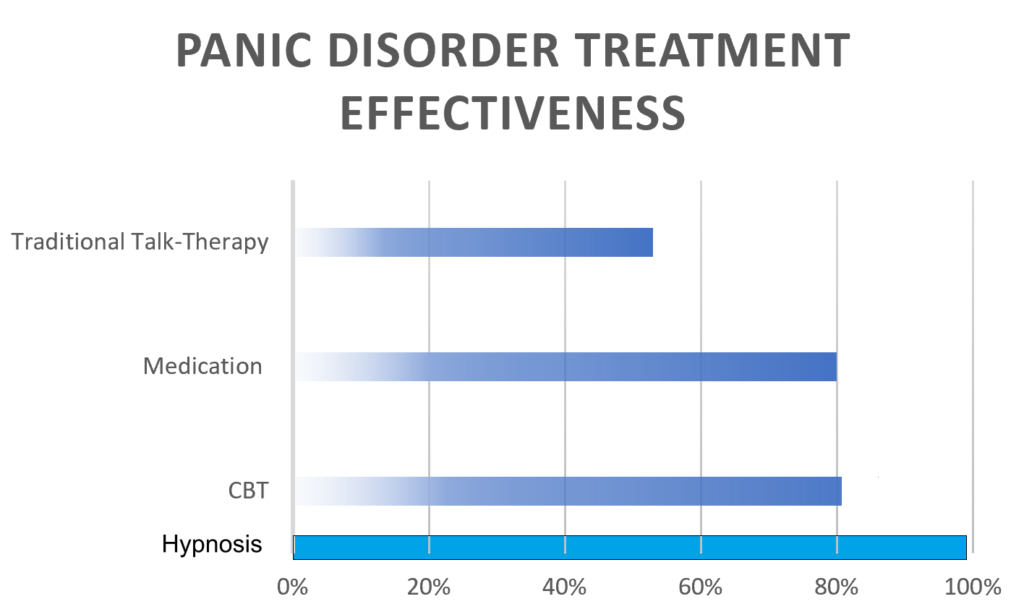
Generally, treatment for panic attacks aims to lessen the impact of anxiety and attacks on your life and to teach you ways to cope whenever you feel that an attack may be triggered.
The treatment approach you undergo will depend on your personal situation and the severity of your symptoms. You will never be forced to undergo treatment that you do not like.
Psychotherapy – the most popular treatment for panic disorder
Psychotherapy, often known as talk therapy, is a popular treatment option for panic attacks and panic disorder. Psychotherapy can assist you in gaining a better understanding of panic attacks and panic disorders and learn how to manage them.
Cognitive-behavioral therapy is a type of psychotherapy that can help you learn from your own experiences that panic feelings are not hazardous. Your therapist will guide you through a safe, repeated process of re-creating the symptoms of a panic attack. The episodes begin to subside once the bodily sensations of fear no longer feel frightening. Treatment can also help you overcome your anxieties about situations you’ve avoided due to panic episodes.
Treatment outcomes might take time and effort to see. Within a few weeks, you may see a reduction in panic attack symptoms, and within a few months, you may notice a considerable reduction or complete disappearance of symptoms. You can make appointments for periodic maintenance visits to help keep your panic episodes under control or address recurrences.
Medications – effective treatment for panic attacks
If you’re suffering from panic attacks or depression, medications can help you manage your symptoms. Several medications have been proven to help treat panic attack symptoms, including:
- Selective serotonin reuptake inhibitors (SSRIs) –SSRI antidepressants are often advised as the first line of treatment for panic attacks since they are generally safe and have a low risk of significant adverse effects. Fluoxetine (Prozac), paroxetine (Paxil, Pexeva), and sertraline are SSRIs that have been authorized by the Food and Drug Administration (FDA) for the treatment of the panic disorder (Zoloft).
- Serotonin and norepinephrine reuptake inhibitors (SNRIs) – These drugs belong to a different class of antidepressants. For the treatment of panic disorder, the SNRI venlafaxine (Effexor XR) has been authorized by the FDA.
- Benzodiazepines – These sedatives are depressants of the central nervous system. Alprazolam (Xanax) and clonazepam are two benzodiazepines authorized by the FDA to treat panic disorder (Klonopin). Because benzodiazepines can be habit-forming and induce mental or physical dependency, they are usually only administered for a limited period. If you have a history of alcohol or drug abuse, these medicines are not for you. They can also interact with other medications, resulting in potentially severe adverse effects.
Things you should know about Panic Attacks
When there is no genuine threat or apparent reason, a panic attack is a rapid bout of extreme dread that produces significant bodily reactions. Panic episodes may be pretty terrifying. You may believe you’re losing control, suffering a heart attack, or even dying when panic attacks strike.
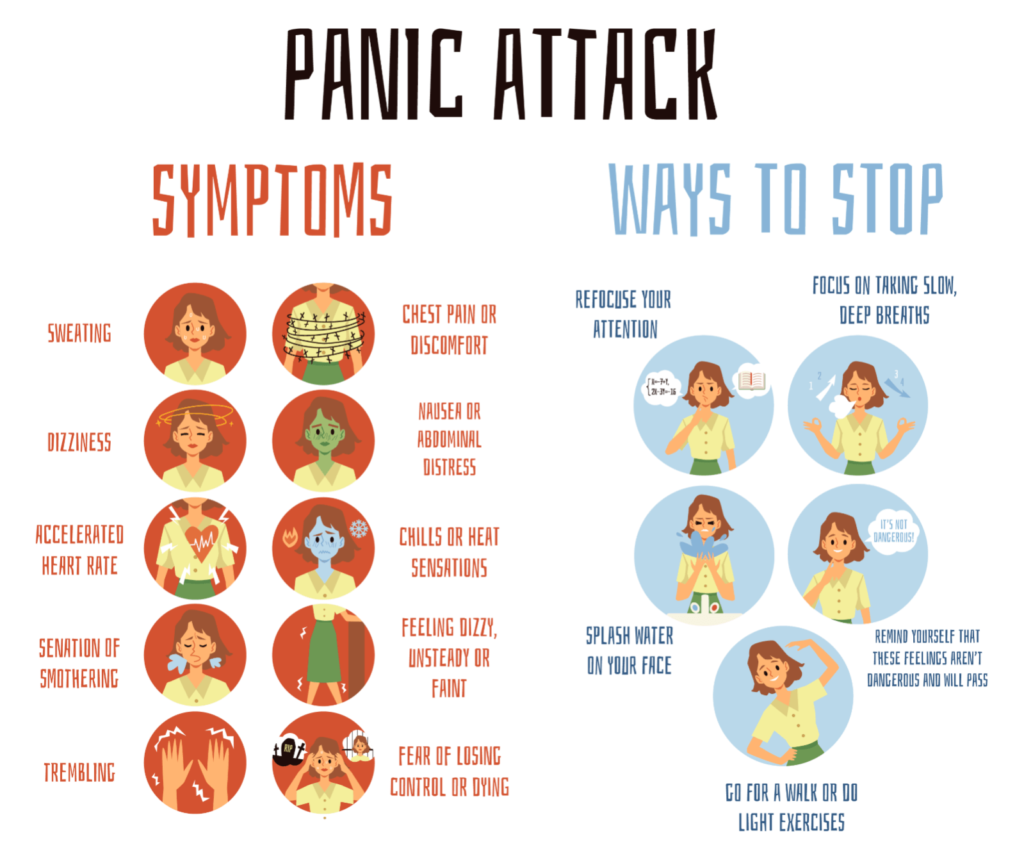
Many people only experience one or two panic attacks throughout their lives, and the condition fades away after the stressful event is over. However, if you’ve had recurring, sudden panic attacks, you may have panic disorder and spent lengthy amounts of time in constant terror of another attack.
Even though panic attacks aren’t life-threatening, they may be scary and have a significant impact on your quality of life. Treatment, on the other hand, can be highly successful.
Causes of panic attacks
Although the exact causes of panic attacks and panic disorder are unknown, the following factors may have a role:
- Genetics
- Major stress
- Temperament that is more prone to negative emotions or is more easily irritated
- Changes in the way different regions of your brain work
Panic attacks might strike quickly and without warning, but specific events generally bring them on over time.
According to some studies, panic attacks are caused by your body’s normal fight-or-flight response to danger. If a grizzly bear charging at you, for example, your body would respond immediately. Your heart rate and respiration would quicken as your body prepared for a life-threatening situation. In a panic attack, many of the same reflexes occur. However, no one knows the causes of panic attacks when there is no evident risk.
Risk factors
Panic disorder symptoms generally develop in late adolescence or early adulthood, and women are more likely than men to suffer from it.
The following factors may raise your chances of getting panic episodes or panic disorder:
- In the family, panic symptoms or panic disorder
- Major life stressors, such as a loved one’s death or critical sickness
- A traumatic incident, such as sexual assault or a catastrophic automobile accident
- Significant life changes, such as a divorce or the birth of a child
- Tobacco use or high caffeine consumption
- a history of physical or sexual maltreatment as a youngster
Panic attacks symptoms
Panic attacks usually strike unexpectedly and without notice. They can happen when you’re driving, shopping at the mall, sleeping, or in the middle of a business meeting. You may experience panic episodes once in a while or regularly.
There are many different types of panic attacks, but the symptoms of panic attacks for all of them usually peak within minutes. After a panic attack episode has passed, you may feel tired and worn out.
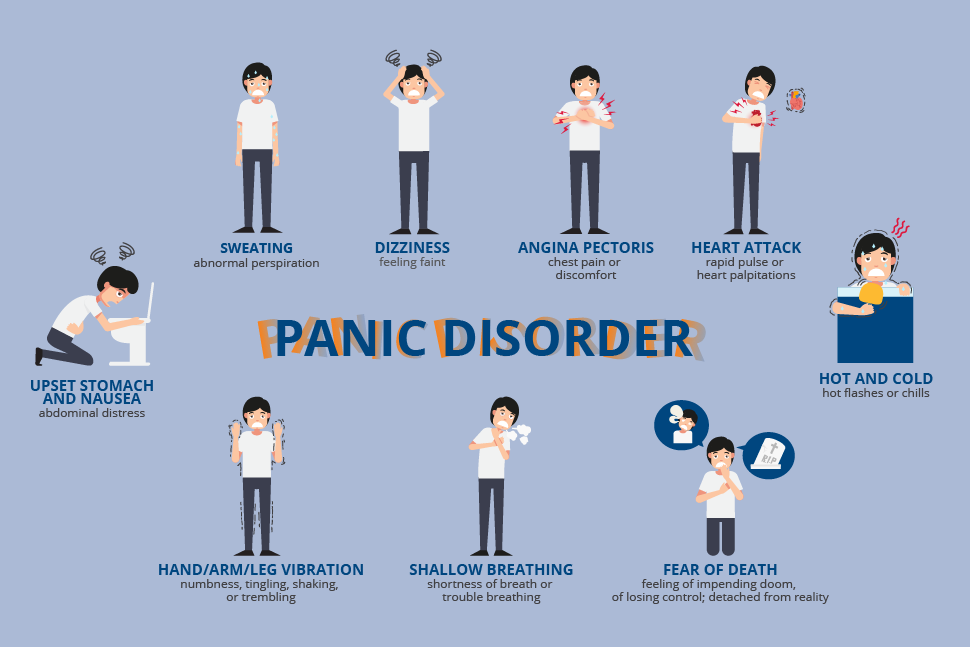
Some of the following signs or panic attacks symptoms are common:
- a feeling of imminent calamity or peril
- The fear of losing control or dying
- Heart beating at a breakneck pace
- Sweating
- Shaking or trembling
- Chills
- Flashes of heat
- Nausea
- Cramping in the stomach
- Pain in the chest
- Headache
- Dizziness, lightheadedness, or faintness are all symptoms of dizziness.
- Feelings of numbness or tingling
- Unreality or detached feeling
One of the most challenging aspects of panic attacks is the constant anxiety of having another one. And this is one of the major symptoms of panic attacks. You may be so afraid of panic attacks that you avoid circumstances where they may happen.
Complications from panic attacks and other forms of general anxiety disorder.
Panic attacks and panic disorder may impair nearly every aspect of your life if left untreated. In addition, you may be so scared of having additional panic attacks that you live in continual terror, causing your quality of life to suffer.
The following are some of the possible complications that panic attacks might cause or be connected to:
- Specific phobias emerge, such as a fear of driving or leaving your house.
- For health problems and other medical disorders, you should see a doctor regularly.
- Social encounters are avoided.
- Workplace or school issues
- Depression, anxiety disorders, and other mental illnesses are all common.
- Suicide or suicidal thoughts are more likely to occur.
- Misuse of alcohol or other substances
- Financial difficulties
Some persons with panic disorder experience agoraphobia, which is when they avoid locations or circumstances that make them anxious because they are afraid of not leaving or obtaining treatment if they have a panic attack. Alternatively, you may become dependent on people to accompany you when you leave the house.
When to see a doctor?
If you are experiencing signs of a panic attack, get medical attention as soon as possible. Panic episodes are not harmful, despite how unpleasant they are. However, panic episodes are difficult to control on your own, and they may worsen if not treated.
Because panic attack symptoms can mimic those of other severe health conditions, such as a heart attack, it’s critical to get your panic attack symptoms assessed by your primary care physician if you’re not sure what’s causing them.
Holistic treatment for panic attacks
Natural remedies for panic attacks are generally safe to use along with more traditional treatments. However, dietary changes and some natural supplements can change the way anti-anxiety medications work, so it’s important to check with your doctor before trying these solutions. Your doctor may also recommend other natural remedies for panic attacks.

Recent studies show that about half of folks who suffer from a generalized anxiety disorder, PTSD, and panic attacks undergo some form of holistic therapy to relieve their symptoms.
Part of the reason people may be drawn to integrative treatment for depression or anxiety is the holistic perspective that is found in most integrative approaches. This perspective takes into account the complex nature of depressive and anxiety disorders and the myriad of reasons people suffer from them.
Hypnosis for panic attacks – #1 panic attacks treatment
Hypnotherapy for panic attacks has been demonstrated in studies to assist with tension, fear, and worry. It can also be used to help people to cope with panic disorder symptoms. For example, a person with panic disorder may deal with specific symptoms and overcome restrictive behaviors while under hypnosis. Hypnotherapy can help by increasing your self-awareness and allowing you to contact these feelings. Once a person has overcome their defenses, it becomes easier to go back to the point where the anxiety started or simply understand what was causing the stress.
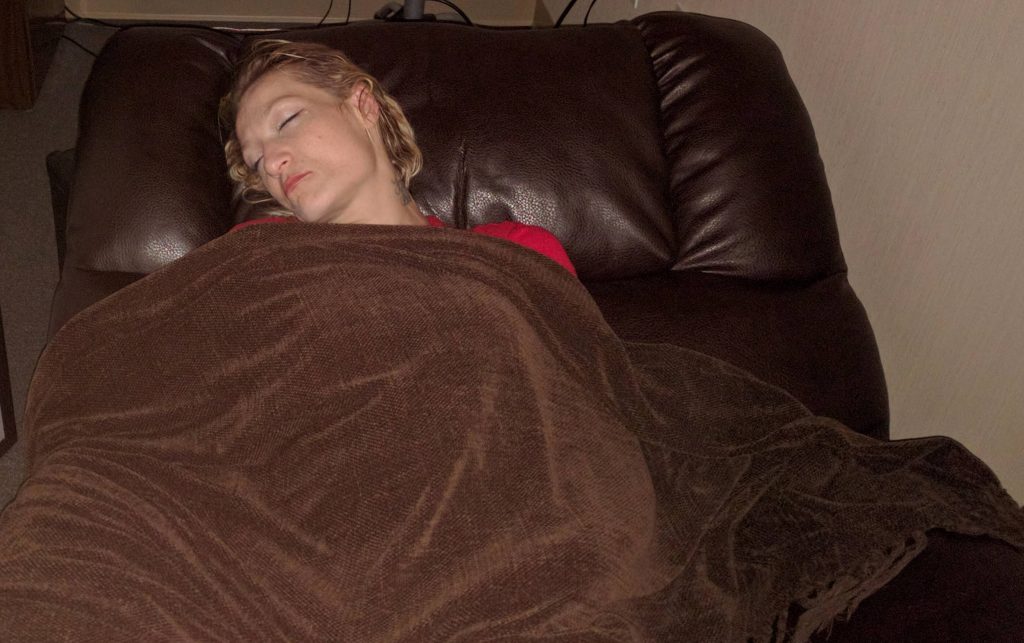
Hypnosis for panic attacks and anxiety can help rebuild self-confidence and increase confidence, as well as help reduce feelings of fear and worry. It can help you learn and develop your ability to access a calmer state of mind necessary to cope with the overwhelming emotions you are experiencing.
Hypnosis for panic attacks is similar to hypnotherapy for anxiety. It aims to access your subconscious and use the power of suggestion to encourage positive change. The hypnotherapist’s suggestions are tailored to your individual situation; what is causing your panic attacks and why, and working to change the way your body reacts to triggers.
Suggestions may include:
- “You are in control, nothing will harm you”
- “Slow down your breathing, it will help you feel calm.”
- “You can get through this, just breathe.”
The idea behind these sentences is that the next time you feel an impending panic attack, your subconscious mind will revert to these statements to help you cope.
Hypnosis for panic attacks can help patients to reclaim a sense of self-control and normalcy in their life. It can help people to understand what might be causing their anxiety, help them recognize the signs of an attack onset, and provide them with tools to manage and overcome feelings.
Acupuncture for panic attacks – an ancient Chinese treatment
Acupuncture for panic attacks has been found to help balance cortisol and serotonin levels, which can assist in smoothing out emotional states and control stress reactions in the body.
Fear forces Qi, the bioenergy that flows in meridians through the body, to move downwards; this causes sensations of drowsiness and disorientation. Anxiety is related to the kidneys, which are involved in releasing adrenaline and cortisol in response to stressors. Anger and frustration have to do with the liver, sadness has to do with the lungs, and worry has to do with the spleen. After thorough counseling to understand the nature of a person’s panic attacks, an acupuncture practitioner may select points to work on the appropriate organ systems to promote the smooth flow of qi. Acupuncture treatment has been shown to help balance cortisol and serotonin levels, which helps balance the emotional state and regulate the body’s stress responses.
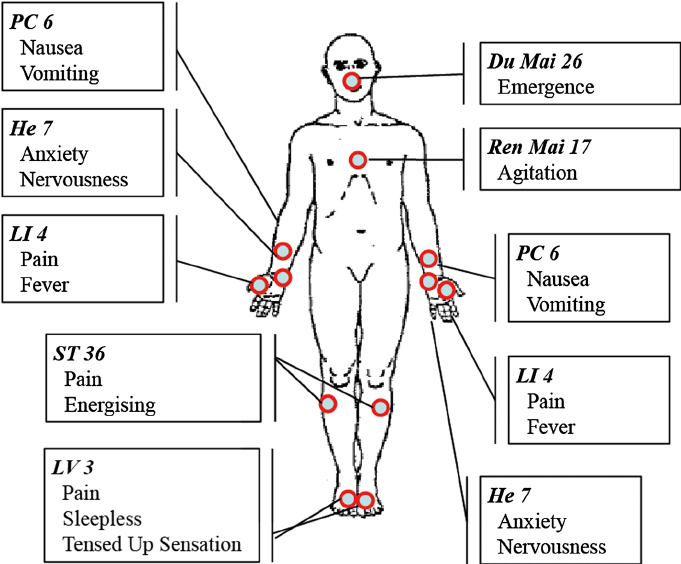
Herbal medicines and diet are essential parts of a thorough TCM panic attack treatment plan. Your acupuncturist will most likely prescribe a specific herbal combination to assist the kidneys and other organs, as well as for instructions on which foods are most and least helpful in resolving the chronic stress effects that underpin panic disorder.
Homeopathy for Panic Attacks – an effective and safe natural panic attacks treatment
According to recent studies, homeopathy is as effective as diazepam (Valium) and benzodiazepine (Lorazepam or Ativan) in treating nervousness and anxiety, but without harmful or addictive side effects.
In a small study performed at the psychiatry department of the University of Pennsylvania, 60% of participants with severe depression, social phobias, or panic disorders responded favorably to homeopathic treatment. It was even used to help anxious rats!
With the right homeopathic treatment, those living with debilitating anxiety can once again have a happy and worry-free life.
As always, homeopathy treats animals as effectively as humans. If your animal companion is prone to fear or panic, the appropriate remedy will also help.
The most common remedies for bothersome anxiety and nervousness are listed below, but chronic anxiety disorders require treatment. For the best homeopathic results, make an appointment with a qualified homeopath.
Aconite
Aconite is a homeopathic remedy for severe, abrupt anxiety, panic, or dread. Panic might be linked to a traumatic event in the past. This form of panic is characterized by dry skin, a dry mouth, and a rapid pulse.
Argentum Nitricum
Worry and nervousness when the person is unsure of what is likely to happen – this is the most common symptom to be treated with Argentum Nitricum. The longer they dwell on the anxiety, the more it gets worse. They are in a hurry, feel the heat, and crave sugar or sweets. Sugar can cause digestive upset and diarrhea and gas can be triggered by anxiety. People who are successful with Arg-n may also have strange compulsions and “what if …” thoughts. These can include things like walking in a line of traffic, throwing yourself from a height, or ramming something into an outlet. Anxiety worsens with overheating and they feel better in the fresh air and away from crowds.
Arsenicum Album
Arsenicum Album type of anxiety emphasizes safety and security issues, what will happen in the future, especially at night and when alone. They tend to worry about health, thieves, or money. To manage this anxiety, they become overly demanding, perfectionists, and selfish in their insecurity. They feel better in the company but become critical of others and control behavior. They are usually overly clean and tidy, cold, and better for heat.
Calcarea Carbonica
Those who need Calcarea Carbonica are afraid of changes and losing control. As a result, they insist on a routine and struggle to keep the same, which can make them seem stubborn or stubborn. Often heavily built, they tire easily with exertion or when walking uphill or upstairs. They sweat easily when exercising or sleeping, especially on the nape of the neck. Fear of the dark, insects, spiders, and animals, especially dogs, is common. They cannot stand hearing or watching unpleasant things and acts of cruelty. At times, they can struggle with confusion and worry about going crazy.
How to prevent panic attacks
There is no way to guarantee that panic episodes or panic disorder will not re-occur. The suggestions listed below, on the other hand, could be helpful.
- To prevent panic attacks from growing worse or becoming more common, get therapy ASAP.
- Maintain a regular physical exercise regimen, which may help to prevent you from GAD.
- Avoid smoking and caffeine. They can increase anxiety.
- Do not drink alcohol or use illegal drugs. They may seem to calm you down. However, they can upset your emotional balance, disrupt your sleep, and cause drug conflicts.
- Get enough sleep. It keeps you from being groggy during the day.
- A number of medications are helpful in preventing panic attacks. Consider talking with your doctor to see if this is right for you.
- Inner dialogue: Many people with anxiety, depression, or panic disorder are stuck in a cycle of negative thoughts. When a panic attack strikes, a person begins to think “this is a disaster” or “I am dying”. Practice telling yourself what to say to prevent a panic attack, such as “this is just anxiety” or “this will be over soon”. Instead, look for something near you to focus on and ground yourself by naming it.
- Eat foods rich in B vitamins: B vitamins support the nervous system, so it’s important to highlight them in your diet. Foods rich in B vitamins include leafy vegetables, beans, turkey, salmon, eggs, and nutritional yeast.
Conclusion
Homeopathy is a reasonably safe alternative to medications to consider when it comes to natural treatment for anxiety and panic attacks. It could also help with panic attacks in a pinch. Moreover, it has few adverse effects and may be sufficient to cure moderate general anxiety disorder. Homeopathy should not be used as a first-line treatment for more significant types of anxiety. Instead, hypnotherapy or hypnosis for panic attacks that have more studies proving its efficacy is safer alternatives to consider. If homeopathy does not help your anxiety or you encounter adverse effects, you should stop using it. Consult your homeopath as soon as possible.
Highly sedating acupuncture points are often needed in acute cases where the patient may have difficulty maintaining mental health or self-control.
Most of the panic attack patients in my clinic are hardworking people with very busy schedules. Daily stress in the workplace, combined with family and family problems, tends to build up in the system until the psyche breaks down. Combine some of the aforementioned concerns with lack of time for reflection and rest, financial hardship, and perhaps a lack of community support, and the average person might see panic attacks emerge. The idea of a mind-body connection is still fairly new to Western medical thought, but the belief that the physical, emotional, and spiritual are all inextricably linked has been part of traditional Chinese medicine theory for thousands. years. According to TCM, emotional energy can build up in the body; if it is not released, it can cause imbalances.
You will be pleased to know that hypnosis is the right tool to deal with any panic attack. You will lose the need to anticipate the next panic event. The environment that caused the panic will no longer appear threatening. You will enjoy a new sense of control and a deeper level of self-confidence. We use powerful hypnosis techniques to communicate through the same channels your mind uses to cause panic. Consequently, we reveal, isolate and remove these negative associations. Your unconscious will learn to feel calm in your surroundings or subject of panic. It is important for your subconscious to learn that the normal daily activity that once triggered an attack is not a threat. You can learn to feel calm while going to school, driving a car, being in a public place, or any other normal, safe activity that poses no real danger.
If you or some loved one looking for holistic panic attacks treatment contact Philadelphia Holistic Clinic. We are offering all kinds of natural treatment approaches including acupuncture, homeopathy, hypnotherapy, etc. contact our clinic and schedule your appointment with Dr. Tsan for a comprehensive holistic evaluation. You will receive customized treatment based on your medical condition, body constitution, personal believes, gender, age, and other criteria.
To schedule your appointment call (267) 284-3085 or scan the QR code below.
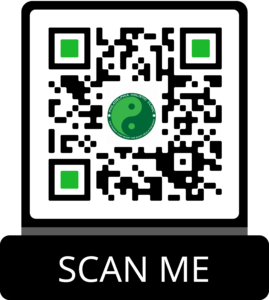
Comments
Post a Comment